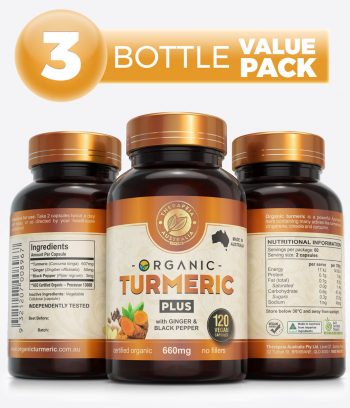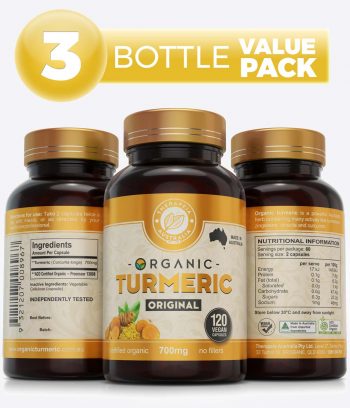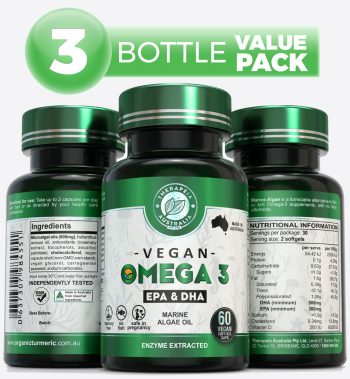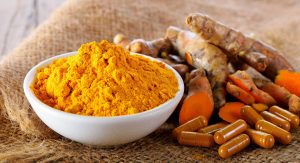Introduction
Before we look at this question, let me say a little bit about myself. I am a Naturopath, having studied at the Southern School of Natural Therapies (SSNT) in Melbourne, with a Bachelor Degree in Health Science (BHSc). Subjects included herbal medicine, pharmacology and nutritional biochemistry. My goal is to help you understand what the research and evidence means and how it relates to the real world – how it relates to you 🙂
Ok, let’s get started!
NOTE: you can skip to the summary of this article by clicking here
Turmeric and Black Pepper – a popular combination
The most popular questions I’m asked in regards to turmeric is “Does your turmeric contain black pepper”? In fact, it has become such a big topic that turmeric is almost synonymous with black pepper. Even fellow colleagues and teachers, whom I have great respect for, have made a point to tell me (and teach in class) that I must have black pepper with my turmeric or I won’t receive the benefits. I’ve actually heard people say, and tell me point blank, if turmeric doesn’t have black pepper it won’t have any effect because you won’t absorb it.
So why is everyone obsessed with adding black pepper to turmeric?
Well the short-ish answer is, there was a study in 1998 where researchers observed the absorption and metabolism of curcumin (an active of turmeric) in humans and rats to determine the bioavailability of curcumin. The results showed that 2g of curcumin by itself was poorly absorbed in humans, although rats seem to absorb curcumin relatively well by itself. The human subjects (10 males aged 20 – 26) were then given 2g of curcumin with 20mg of piperine (an active molecule found in black pepper) and after 45 minutes, curcumin blood levels went from an average of 0.006mcg/mL to an average of 0.18mcg/mL. This equates to a 2000% (relative) or 30x (actual) increase in curcumin blood levels because of piperine. The rats went from an average of 0.83mcg/mL to an average of 1.70mcg/mL after about 15 minutes. This equates to just over 104% or 2x actual increase in curcumin blood levels. Statistically significant for rats, and clinically relevant for humans. This is the study everyone refers to when talking about turmeric and black pepper.
The question is, how does that relate to you and your health? In order to answer this question, we need to understand the difference between turmeric and curcumin, and the difference between black pepper and piperine.
Is Turmeric and black pepper the same as curcumin and piperine?
The first thing to understand is that curcumin is not turmeric and piperine is not black pepper. It would be like comparing the difference between the benefits of eating a blueberry (as a whole food) to the benefits of eating vitamin C extracted from the blueberry. In this analogy the blueberry = turmeric and vitamin C = curcumin. While vitamin C is an important part of the blueberry, there are so many other powerful actives in blueberries that have health benefits, so you will have a completely different result if you eat whole blueberries compared to eating vitamin C extracted from blueberries. Similarly, there is a very big difference between taking turmeric, which is a whole food, and taking curcumin, which is a single molecule extracted from turmeric. This can be a little confusing to understand at first so here is breakdown of these ideas.
- Understanding turmeric and black pepper
Turmeric contains hundreds of different active molecules, one of which is curcumin, and black pepper also contains hundreds of active molecules, one of which is piperine. It is therefore impossible to trace which molecule is doing what in the body when eaten as a whole food because there are just too many combinations of active molecules when you take turmeric with black pepper. This is why most studies are on curcumin, not turmeric. It’s very difficult to isolate which active is having the biological effect in the body.
- Turmeric has more biological activity (health benefits) than curcumin
Due to the nature of turmeric, that it contains hundreds of active molecules, the potential health benefits far outweigh the potential benefits of curcumin by itself. In fact, when curcumin is removed from turmeric, you still get the same benefits as curcumin. We know this because some researchers decided to remove the curcumin from turmeric and see what the benefits were, amazingly, curcumin-free turmeric exhibited many of the same biological activities as curcumin. Fascinating! It really makes you wonder if you should be spending your money on curcumin supplements which are far more expensive (and often less effective) than turmeric as a whole food.
- Black pepper, piperine and how it improves absorption
As mentioned earlier, there are many other actives in black pepper besides piperine and these other actives also have incredible activity, as has been shown in this study. The reason is due to the many actives contained within black pepper, including piperine. It should be noted however, that black pepper contains anywhere between 2-9% piperine which (at 9%) is very high for a single active in a food. Now, we know that piperine can significantly improve the blood levels of curcumin, but piperine in black pepper doesn’t just affect curcumin, it can (and does) affect the absorption and metabolism of hundreds (if not thousands) of different molecules, both natural and synthetic. Any molecule that is processed via P-glycoprotein or CYP3A4 enzyme will be affected by piperine. This means two things: 1) The piperine in black pepper will alter (its not always beneficial) the absorption and metabolism of other molecules as well as improving the absorption of many actives in turmeric and; 2) You should be careful when combining any pharmaceutical medication with black pepper or any supplements that contain black pepper or piperine.
- Turmeric absorption is improved by its naturally contained essential/volatile oils
A very important point to understand with turmeric is that the naturally occurring molecules in turmeric actually help each other to absorb and metabolize. So in other words, turmeric by itself, with nothing added, absorbs quite well because of the synergism of the molecules contained within turmeric. More specifically, the volatile oils naturally contained within turmeric significantly improve the absorption of other molecules in turmeric (such as curcumin) which has been shown in the research. An example is found in a study where turmerone, one of the main volatile oils contained within turmeric, significantly increased the absorption of curcumin by human intestinal cells. But this is not the only example. Some researchers investigated the effects of curcumin with piperine VS curcumin with turmeric essential oils and found that curcumin with turmeric essential oils to be slightly more effective for treating depression than curcumin with piperine. This is very interesting considering that piperine increases absorption of curcumin by up to 30x as discussed earlier. Furthermore, research has shown that the naturally occurring oils in turmeric improve the anti-inflammatory effect of curcumin.
But it actually gets better. Evidence shows that the essential oils naturally contained in turmeric, not only improve absorption of turmeric, but have their own biological effects such as antioxidant, anti-inflammatory and neural stem cell proliferation activity. When you take a curcumin supplement, it usually doesn’t contain the essential oils naturally found in turmeric, not to mention the other hundreds of actives.
Does this mean we don’t need to use black pepper with our turmeric?
In a word, yes. You don’t need black pepper to absorb turmeric. There is no harm in adding black pepper to your turmeric, in fact the evidence shows it will help to metabolise many of the actives contained within turmeric or any other food for that matter. But the truth is you don’t need it to absorb the molecules contained within turmeric, including curcumin. The main difference is that turmeric with black pepper will most likely absorb faster than turmeric by itself and may stay in the blood stream longer. This isn’t good or bad, it just depends on what you’re taking the turmeric for. For some conditions, like gastrointestinal ulcers for example, you may want the turmeric to stay in your digestive tract longer. A study using turmeric powder (not curcumin) for duodenal and gastric ulcers showed some very impressive results. After 8 weeks of taking 600mg of encapsulated turmeric (5 times daily), 18 of 25 people had complete absence of their ulcers.
There is also the traditional use of turmeric in Ayurveda (East Indian medicine) where turmeric powder is mixed with cow’s milk, ghee and black pepper. This combination has been used for many hundreds, possibly thousands, of years in India for a range of different illnesses, and is firmly a part of their cultural medicine. The fact that turmeric was traditionally prepared this way (with black pepper), is reason enough to consider taking black pepper with your turmeric, due to the holistic effect of this combination on the body and the synergistic effects of black pepper, fat (oil) and turmeric. The scientific world is slowly building evidence to support this formulation and to also explain the reasons why it is beneficial.
Turmeric and our personal experiences
We are all unique, and this includes our biology. What works for one person, doesn’t always work for someone else. Our bodies can vary significantly when it comes to how we absorb and metabolise different foods or medications. Some people have very strong effects when taking a particular herb or drug, while others experience a mild effect, and may need more of that very same medication to achieve the same results biologically. Of course, you also have those who respond negatively to that drug or herb. Generally though, most people will respond in a similar fashion and so for the majority of people, it is common to make generalisations, particularly in herbal medicine.
When it comes to taking turmeric without black pepper, there are many reports about its efficacy. This is true not only from the feedback we have from our customers, but also from people all over the world. Read a few forums or comments on blog posts and you will quickly see that many people do experience strong results from taking turmeric, however often times people are not specific in what they are taking (turmeric, curcumin or a specific brand, the dose, for how long, etc) so it can be very difficult to get an accurate assessment. This anecdotal information is still evidence, but it not as reliable as controlled trials, and requires a lot more work to verify what is real and what is marketing or exaggerated.
We’ve been in the turmeric business for over 5 years now and we still have many customers using our ORIGINAL product (no black pepper) with good results. These are people who are using it for very specific health issues (most often pain/inflammation) not just for ‘general health’. In fact, I personally still use the ORIGINAL product because my body does not respond well to black pepper, and it works very well for me.
Turmeric and yellow stools
One sign that what you’re eating is not being absorbed or metabolised effectively, is when your stool or urine becomes the same colour as what you’re eating. For example, there is a condition called beeturia, which occurs when the red pigments in beetroots are not metabolised effectively and a person’s urine and stool have a very obvious red tinge. The same thing can happen with curcumin but has only been observed at very high doses of 8,000mg (8 grams) and above. The big difference between beetroot and curcumin is that beetroot is a whole food and it is only the red pigment that is not being metabolised while the rest of the beetroot is metabolised. Curcumin, however is a single molecule (more accurately a combination of 3 molecules collectively known as curcuminoids) and is what makes turmeric yellow. Most people don’t experience yellow stool, even when taking curcumin (the yellow pigment of turmeric) at high dose, what to speak of turmeric, which is between 3-8% curcumin. There are currently no controlled trials that show yellow stools as a side effect of turmeric intake. Not having yellow stools is not necessarily evidence that you’re absorbing all the turmeric, but it does suggest that by the time it has reached your large intestine, you’ve absorbed at the very least, a large portion of the turmeric you’ve ingested.
If you do begin to experience yellowing of stools from taking turmeric, then this could be a sign of something much more serious with your digestive system, and you should visit your local GP to get a check-up. Most likely, you will have other symptoms, such as abdominal pain, bloating, diarrhoea, blood in the stool and so on.
Black pepper and ginger sensitivities
Most people don’t have a problem with black pepper and can easily add it to food or take it with supplements. However, some people do have issues with black pepper and can experience symptoms like diarrhoea, stomach cramps, rashes (usually from direct skin contact), coughing and feeling lightheaded. More severe symptoms may include swelling of the face, tongue or lips, vomiting, nausea, asthma and anaphylaxis. Severe symptoms are rare, but there was a reported case where a 17 month old boy experienced facial swelling and a severe cough from ingesting cayenne and black pepper.
Ginger allergies are also quite rare, although there is anecdotal reports of people who cannot eat ginger due to allergy symptoms such as swelling of the lips or tongue, itching of the mouth, eyes or throat and developing hives or a rash.
For this reason, our ORIGINAL turmeric product is well suited. It is very difficult to find an encapsulated turmeric without black pepper or some other added herb to aid with digestion/absorption. But for the reasons described in this article, we still sell our ORIGINAL turmeric capsules. If you like, you can try them for yourself.
Summary
- The combination of turmeric and black pepper is extremely common, especially in traditional use
- Turmeric and black pepper are whole foods, whereas curcumin and piperine are single molecule extracts from each (respectively)
- Turmeric absorbs well without black pepper due to the many actives that come naturally with the turmeric root, specifically the essential oils
- Black pepper can and does improve the metabolism of turmeric but is not necessary for the absorption of turmeric
- Some people suffer from black pepper or ginger sensitivities and need a turmeric product that does not contain either black pepper or ginger







Wοw, this article is nice, my уoungеr sisteг
is analyzing these things, therefore I am going to tell her.
Thank you for giving a detailed explanation on this topic. This is exactly what I was looking for. Great article!
This was just the info I was looking for. The article was clear, concise and to the point. Thank you!
Thank for the valuable info.
I was looking for this.. So much back and forth about pepper/piperine……
I Started the honey, ginger, turmeric, black pepper, cinnamon, vanilla extract,. And I develop a little cough I’m thinking it’s because of the black pepper. So that was my question and it has been answered. So now I will take the black pepper out, and just use the other ingredients for diabetes. Thank you blessings
Clear and credible. Exactly the info I was looking for. Black pepper formulations give me heartburn and I needed to unravel the hype around its effect on turmeric absorption. Thanks!
Hi,
Due to my having celiac and that I cannot take black pepper I am grateful for your article.
It was GREAT for someone to actually break down the pros and cons.
Many thanks!
Very well explained. I have a hiatus hernia which makes me very sensitive to pepper ginger citrus fruits and chillies. I tried having turmeric with ginger and pepper but had to give it up in 4 days as the pain and burning sensation was unbearable.
Thank you for a very sensible and well explained article
I’ve been taking plain Tumeric supplements for the last 10 days or so. My urine has turned yellow. My stools are not yellow though. Does that mean that the benefits of Tumeric are not being absorbed by my body?
Hi Sharon,
Its possible that your body is not able to break down the curcuminoids in the turmeric properly and this is making your urine turn yellow. However, its more likely that you might have taken some B vitamins at the same time as the turmeric, as they are much more known to cause yellow urine.
Dear Team , like the controversy surrounding the need/desire to take black pepper/piperine with your turmeric/curcumin , what is your opinion of the need or otherwise of boiling the turmeric before drying it and what do you do ?
Regards Greg
Hi Greg,
Thanks for your question. Some foods are better off when heated and become more accessible to the body (like rice for example) while other foods (like fruits) start to lose their potency the more they are heated. When a food is heated, there is always something lost due to the nature of chemistry and physics, but heat also activates as well. With short amounts of medium intensity heat, turmeric holds many of its benefits. Heat also reduces the amount of bacteria that come naturally with food when its grown and harvested. The key is just not to over heat or heat for extended periods of time.
I hope this helps!
That helps regarding heating foods! Thank you!!
VERY GOOD ARTICLE..I THOROUGHLY DEVOURED IT! IT CLEARED ALOT OF MUSCONCEPTIONS ON GHIS TOPIC! KEEP UP THE GOOD WORK.
I know turmeric is good for dogs… is the amount of pepper safe for them? The should not have too much.
Hi Seana, thank you for your comment. While black pepper isn’t really considered toxic to dogs, they may experience some upset with large amounts of black pepper. I would start slowly (1 capsule) per day with your dog and let them get used to it first for at least a week and go from there.
I hope that helps!
Hello there! Lovely article. I was wondering if I could take some raw turmeric first thing in the morning just by itself. Would that have anti-inflammatory and gut mucosa healing effects? Thank you in advance!
Hi there, thank you for your question. Turmeric first thing in the morning is a great time to take it and will certainly have a healing effect on the gut mucosa. Best way would be to break down the turmeric as much as possible so either juice or grate it.
I hope that helps!
Dear Team , forgot that I had sent a question as I had just gone back to re-read your article re.black pepper etc , which is undoubtedly the most scientific,best researched and written article on the subject ; just to clarify about boiling turmeric as part of the curing process , does short time .i.e. 15-30 minutes of steaming/boiling effect the efficacy/potency of the final product or does it just come down to a personal preference as to how you go about the whole process? I always understood the traditional way of processing in India involved boiling , but after speaking to an Indian friend , he said that they always eat it fresh unless they couldn’t get it and hence used a packaged/powdered product . I am a large small grower and just want to make the best product I can for my family and friends
Hi Greg,
Thanks so much for your feedback. Its actually quite a complex subject, but generally speaking, when a food is less processed, more of the active properties are preserved and when you add heat, generally it can start to break down those actives. However, in some cases, heat actually improves or creates other actives that are more beneficial. I would say turmeric is a combination of both. Some more benefits will come have raw (juiced or grated) turmeric, while other benefits will come from heating or condensing the turmeric (liquid or powder). I hope that helps!
Organic Turmeric Team
Thank you for your clearly stated and researched article.
What is your experience with using fresh hturmeric leaves?
Thanks.
Thank you for your very comprehensive analysis of tumeric. For being prepared to share your knowledge so freely. It’s very much appreciated.
I have been supplementing my diet with tumeric, and felt compelled to add pepper, even though pepper does not seem to agree with my digestive processes. I will now feel free to eliminate pepper due to the reasons you outline. Thank you!
Kind regards.
Well, I guess I just wasted $40 because I thought it had to have the black pepper in it and I fell for a sales gimmick, Lol. I guess you win some and you lose some but at least I know now I don’t have to waste all that money in the future which is great! I always jump the gun too quickly. I’ll eventually learn one of these days. Thanks for the info.
I’ve recently read that fenugreek helps turmeric to absorb better. Is there any truth to that?
Hi Leisha,
Yes there is research that shows that specific soluble fibres in the fenugreek (galactomannans) significantly improve absorption of curcumin, one of the main actives found in turmeric. In a sense, the soluble fibre does act much like piperine. Its important to understand though, that turmeric has a whole bunch of other phytonutrients that also help to improve the absorption of curcumin in turmeric, and that in general its better to take the whole turmeric rather than just curcumin, or add curcumin to the turmeric.
Nice find Leisha and thanks for bringing it to our attention.
You’re welcome:-) I have a large cup of golden milk every morning. I use almond milk with 1 tsp. of ordinary turmeric powder and heat it in the microwave for 3 minutes to get it good and hot, then let it set for about 5 minutes. Then I add ginger powder and add a capsule of fenugreek, stir and drink. I also make turmeric paste which I take about 1/4 tsp. 3-4 times a day. I have osteoarthritis in both hips and knees (bone on bone) and I find this helps me a lot. I have since reading your article not added the freshly ground peppercorns anymore though, because it irritates my stomach. The paste has organic extra virgin olive oil in it and I read that fat like this can also help absorption. Is it true that fat, like in any form helps with absorption? Peanut butter is delicious with it, I add a little in my golden milk sometimes, but is that ok to do?
Hi Leisha,
Thank you for your comment. The first thing I would say is stop using the microwave, as this is intense radiation that can damage actives, particularly fatty acids, in your natural medicines. Yes, it is true that any fat will help with absorption, including olive oil. Peanut butter is also very high in fat so that will help with absorption as well. I would recommend using only peanut butter products made from roasted peanuts, this will help avoid aflatoxin.
Hope that helps!
Garuda